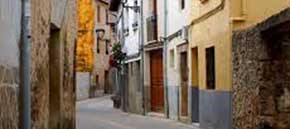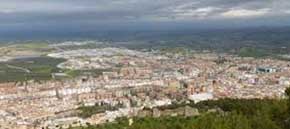Jaén, located in the heart of Andalusia, is a city that surprises with the richness and depth of its Sephardic heritage. Although often overshadowed by other Andalusian cities, Jaén preserves one of the most authentic and best-conserved Jewish quarters on the peninsula, making it a true treasure for lovers of Jewish history and culture.
A crossroads of cultures
The Jewish presence in Jaén dates back at least to the 7th century, though it likely began even earlier. Its strategic location, as the gateway to Andalusia from the Levant and the plateau, favored cultural exchange among Jews, Christians, Muslims, Romans, and Visigoths. For centuries, Jaén’s Jewish quarter was a space of coexistence and prosperity, reaching its peak in the Middle Ages.
The Santa Cruz neighborhood: heart of the Jewish quarter
The old Jewish quarter of Jaén is located in today’s Santa Cruz neighborhood, a maze of narrow, steep streets that still preserves its medieval layout. More than 300 Jewish families once lived here, forming a vibrant and autonomous community, known as the aljama, with its own rules, synagogue, ritual baths (mikvé), taverns, and shops. After the persecutions of 1391 and the establishment of the Inquisition in 1483, many Jews were forced to leave the city or convert to Christianity, though many continued to practice their faith in secret.
Sephardic traces in Jaén’s heritage
Walking through the Jewish quarter of Jaén is to discover traces of its Jewish past in every corner. Highlights include the Monastery of Santa Clara, once the site of the old synagogue, and the Chapel of San Andrés, which preserves symbols and architectural elements that recall its Hebrew origins. In Plaza de los Huérfanos, a large menorah pays tribute to the Sephardic families expelled in 1492. The Arab baths of the Villardompardo Palace, restored and open to visitors, evoke daily life and the meeting of cultures in the city.
Illustrious figures and living memory
Jaén was the birthplace of universal figures such as Hasday Ibn Shaprut, a physician, diplomat, and poet who shone at the court of Al-Andalus and is considered one of the great promoters of the Golden Age of Jewish culture in Spain. The Sephardic memory remains alive in the city thanks to descendants and visitors searching for their roots, as well as efforts to recover and promote the local Jewish heritage.
Sephardic gastronomy and traditions
The Sephardic legacy in Jaén can also be tasted in its gastronomy. Dishes made with eggplant, nuts, honey, and spices evoke ancestral recipes that can still be enjoyed in restaurants committed to reviving Jewish cuisine. Music, festivals, and Sephardic customs are part of the city’s cultural identity and are celebrated in events and themed routes.
An essential visit
Today, Jaén is a prominent member of the Network of Jewish Quarters of Spain, Caminos de Sefarad, and is committed to showcasing its Jewish heritage. Touring its streets, discovering the history of its Jewish quarter, and being surprised by its monuments and legends is a unique experience for any traveler wishing to delve into the living history of Sefarad.
If you are looking for an authentic city, with a fascinating past and a present proud of its diversity, Jaén is the small great Sefarad city you must know.




